So a ghost walks into a bar...
Wadjet Eye Games are a small indie game company focused on developing and publishing a kind of games you don't see very often nowadays, that is, classical point and click adventures. Surely, I'm a nostalgic prick and an old fart, but newer titles such as Broken Age and The Walking Dead don't fit the bill; they're certainly not what I'm personally expecting from a so-called "classical" adventure game, and that is less shiny and "immersive" stuff and more storytelling.
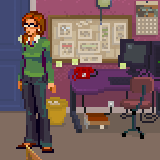 As far as Wadjet Eye go, I've already played, in a somewhat chronological
order, Gemini Rue, Primordia and Resonance, so I'm more or less familiar with
the quite distinct visual style they employ: most of the games are created
using the Adventure Game Studio engine, while the art is pixelated and
as far as I can tell 16-bit, making it very similar to '90s titles. Developed
and published over the course of eight years, the Blackwell games are a very
good measure of the company's evolution in time, as one of Dave Gilbert's
(Wadjet Eye's founder) first creations.
As far as Wadjet Eye go, I've already played, in a somewhat chronological
order, Gemini Rue, Primordia and Resonance, so I'm more or less familiar with
the quite distinct visual style they employ: most of the games are created
using the Adventure Game Studio engine, while the art is pixelated and
as far as I can tell 16-bit, making it very similar to '90s titles. Developed
and published over the course of eight years, the Blackwell games are a very
good measure of the company's evolution in time, as one of Dave Gilbert's
(Wadjet Eye's founder) first creations.
The universe where the series takes place is a typical contemporary fantasy setting: events span about fifty years, starting sometime in the 20th century and ending nowadays, in New York, where, probably not coincidentally, Wadjet Eye Games are also based. The game's main protagonist, although not necessarily a playable character, is Joey Mallone, a ghost somehow destined to be companion to so-called "mediums" whose job consists mainly of bringing ghosts into the afterlife, but also other epic stuff, as is seen in the game.
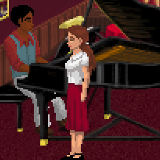 The game's other main protagonist is for the most part Rosangela Blackwell, the
exception being Unbound, which focuses on Lauren, Rosa's aunt. And thus the
games' story evolves from "look ma, I'm a psychic!" to conspiracies and events
spanning "the universe", fortunately without going into much detail regarding
either conspiracies or "the universe", which would have probably made the story
arcs much cheaper in my opinion.
The game's other main protagonist is for the most part Rosangela Blackwell, the
exception being Unbound, which focuses on Lauren, Rosa's aunt. And thus the
games' story evolves from "look ma, I'm a psychic!" to conspiracies and events
spanning "the universe", fortunately without going into much detail regarding
either conspiracies or "the universe", which would have probably made the story
arcs much cheaper in my opinion.
One of the interesting things about the games is that they don't go too much into the main characters' internal issues, although they do subtly emphasize them: Rosa's an introvert by the way she speaks to people; Lauren's a heavy smoker; Joey is, or rather was the typical man of the '30s, with his hat and tie and attitude toward "broads". However, the supporting characters are often portrayed in an excellent manner: the Deacon is a sinner only because he himself believes so; Joseph Mitchell is the journalist archetype; Tanya Corsey is split between her actual and her old self; Lauren's ghost is tired and apathetic, her soul supposedly crushed by all the insanity and the medication.
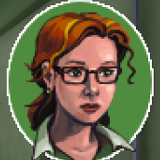 The Blackwell Legacy, created initially as a free game called Bestowers of
Eternity, is probably the least interesting game in the series: Rosa Blackwell
becomes haunted by Joey and works on her first case and that's all; I'm
guessing that this was created as a starting point for the rest of the games,
otherwise it's not a very good game standing by itself. Unbound, actually a
prequel, is on the other hand a huge step forward in terms of storytelling, as
it begins the Countess arc, leading to Convergence as a bridge between the
Countess arc and the Madeline arc. Finally, Deception opens an unfinished
conspiracy arc, while Epiphany brings closure for the Madeline arc and the
entire series. I won't go into details regarding each of the stories, but I'll
mention that I've had a sense of continuity going through all the games almost
at once, which made the overall experience pleasant enough.
The Blackwell Legacy, created initially as a free game called Bestowers of
Eternity, is probably the least interesting game in the series: Rosa Blackwell
becomes haunted by Joey and works on her first case and that's all; I'm
guessing that this was created as a starting point for the rest of the games,
otherwise it's not a very good game standing by itself. Unbound, actually a
prequel, is on the other hand a huge step forward in terms of storytelling, as
it begins the Countess arc, leading to Convergence as a bridge between the
Countess arc and the Madeline arc. Finally, Deception opens an unfinished
conspiracy arc, while Epiphany brings closure for the Madeline arc and the
entire series. I won't go into details regarding each of the stories, but I'll
mention that I've had a sense of continuity going through all the games almost
at once, which made the overall experience pleasant enough.
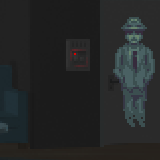 What I didn't like about the story is that, unlike good dramatic art, and more
like comedy and whatnot, it doesn't amount to much. The story's universe
doesn't change fundamentally from the beginning of Legacy to the end of
Epiphany, although, as some of the characters remark, New York is always
changing and it's hard to recognize it from one decade to another; other than
that, we're left with Joey, who's now a human, and without Rosa, and while this
void is certainly interesting, it falls more into the manga-esque open, often
dry, endings and less into the Western drama, which usually leaves us with some
meaning to it all. As far as the universe at large goes, the game returns at
the initial state where the universe at large is an unknown incomprehensible by
the human mind.
What I didn't like about the story is that, unlike good dramatic art, and more
like comedy and whatnot, it doesn't amount to much. The story's universe
doesn't change fundamentally from the beginning of Legacy to the end of
Epiphany, although, as some of the characters remark, New York is always
changing and it's hard to recognize it from one decade to another; other than
that, we're left with Joey, who's now a human, and without Rosa, and while this
void is certainly interesting, it falls more into the manga-esque open, often
dry, endings and less into the Western drama, which usually leaves us with some
meaning to it all. As far as the universe at large goes, the game returns at
the initial state where the universe at large is an unknown incomprehensible by
the human mind.
However, I enjoyed the fact that the story remains very much in a "realistic" setting, without resorting to any crappy mystical stuff, i.e. he's a ghost and she's a more or less ordinary human, and all the "energetic", "aura" pseudo-science doesn't matter too much here. At least that's how most of the story goes, and the story can be brought to an end without caring too much about the mumbo-jumbo.
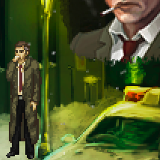 Finally, I must say that I enjoyed the music very much, especially because most
of it is jazz, but not only that. The songs add quite a lot to the atmosphere
and prove to be a good counterbalance to the less masterfully executed parts,
especially in the first games. As I was previously saying, I can only guess
that making the Blackwell games has in time provided Dave Gilbert with enough
experience so that at least the last two are more than pleasant. At the end of
the day I can't say that I'm left with a memorable piece, certainly not as good
as Primordia or Gemini Rue, but it was one that I'd play again some day, if
only to experience stories of lost ghosts again.
Finally, I must say that I enjoyed the music very much, especially because most
of it is jazz, but not only that. The songs add quite a lot to the atmosphere
and prove to be a good counterbalance to the less masterfully executed parts,
especially in the first games. As I was previously saying, I can only guess
that making the Blackwell games has in time provided Dave Gilbert with enough
experience so that at least the last two are more than pleasant. At the end of
the day I can't say that I'm left with a memorable piece, certainly not as good
as Primordia or Gemini Rue, but it was one that I'd play again some day, if
only to experience stories of lost ghosts again.
Meanwhile, I'm looking forward to what other neat stuff Wadjet Eye Games have to pull out of their hats.
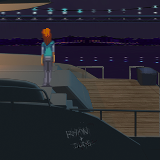
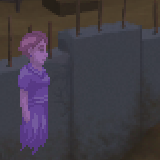

[...] the wave of retro point-and-click adventures started by Wadjet Eye and their Blackwell, before crappy Broken Age, before Grim Fandango and before even classics such as Monkey Island, [...]
[...] the way, we can add the Blackwell series to the same list too. And why not Gabriel Knight, which coincidentally also takes place in [...]